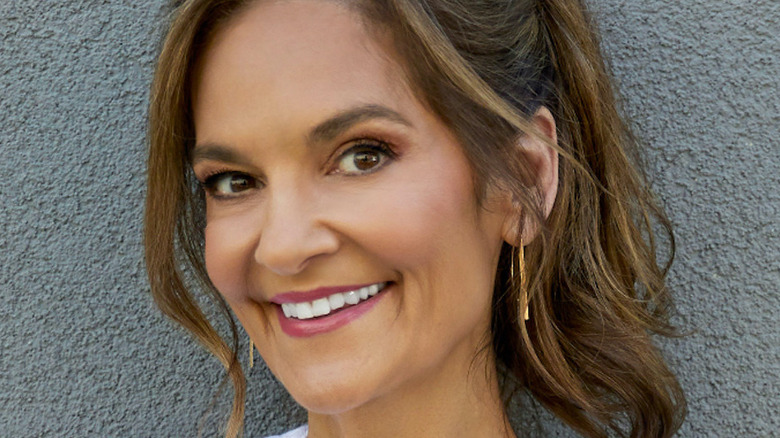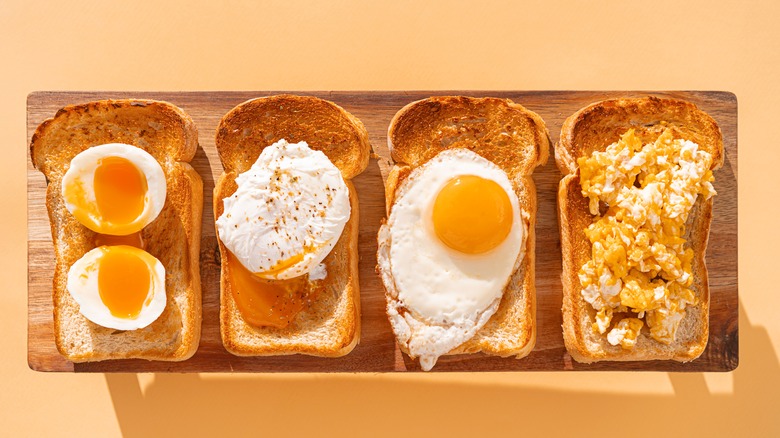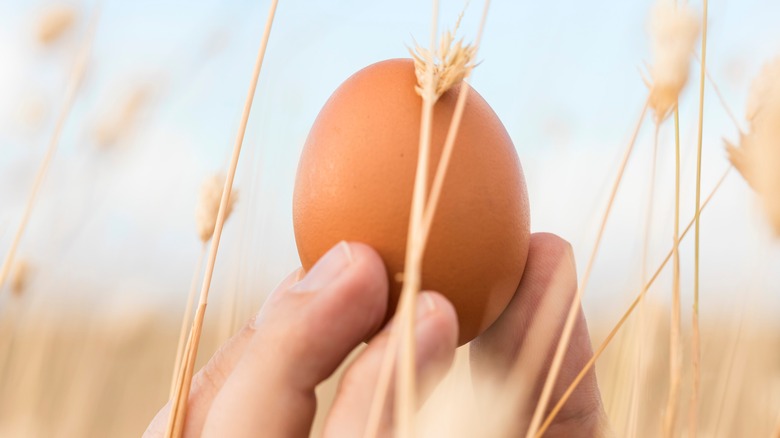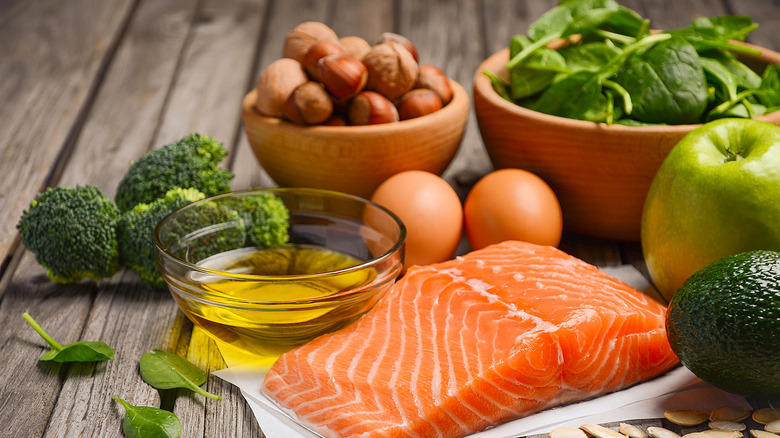Nutrition Expert Joy Bauer Says Why You Should Eat An Egg Every Day - Exclusive Interview
February is American Heart Month, which raises awareness of how we can improve our cardiovascular health. To help us find ways we can eat better, nutrition and health expert Joy Bauer teamed up with The Incredible Egg to create Heart-Check-certified recipes such as Stuffed Quinoa Peppers with Eggs and one-skillet Mexican Rice Bean Baked Eggs.
You might be thinking, "Wait, what? I thought eggs were high in cholesterol. How can they be good for your heart?" Bauer says that idea is "old-fashioned." Sure, an egg might have 186 milligrams of cholesterol, all of which is in the yolk. However, just because cholesterol is high in a food doesn't mean it will become high cholesterol in your blood. A 2013 study in Metabolism had people eat either three eggs a day or the egg-white equivalent per day for 12 weeks. The study found that the group who ate the whole eggs had greater increases in high-density lipoprotein (the "good" cholesterol) while reducing their low-density lipoprotein (the "bad" stuff).
In an exclusive interview with Health Digest, Bauer shares why she believes eggs are important to include in our weekly menus.
Why eggs are part of a healthy diet
Let's talk about Heart Health Month. We know that eggs have gotten a bad rap in the past in terms of high cholesterol content. Tell me what has changed.
People still fear the egg yolk. The American Heart Association has looked at all of the science and the data. There's a Harvard study that has data for 32 years, and what it showed is that eggs can absolutely be enjoyed as part of a healthy diet, yolk and all, and that healthy Americans who ate the yolks regularly as part of a healthy diet did not have ... The eggs were not associated with an increased risk of heart disease.
So after sorting through all of the research and the literature and the science and the findings, the American Heart Association now has endorsed eating eggs, yolk and all, for Americans as part of an overall healthy diet. That's really, really good news because yolks are fabulous and most of the nutrition is housed in the yolk.
But when it comes to the amount, they do say, "up to one a day," [which] feels not very user-friendly. I would say, "on average seven a week," so you could bank them in any way that you want them. You could have a two-egg omelet or a three-egg frittata, and you know on average at the end of the week, it's about seven. I wrote this little jingle. I'm going to try to make it go viral, and it goes like this: "Seven eggs a week to help your brain and body peak." That's my version of the apple a day. I feel like that's a little bit easier for people to understand.
The American Heart Association also says that vegetarians — obviously not vegans — vegetarians that eat eggs have much more leeway, and so do seniors. The one caveat is that if people do have heart disease or are at a very high risk, super-high cholesterol levels or some sort of risk, then I would always say huddle with your personal physician, your cardiologist, and go with their lead in terms of what they would tell you for the amount of eggs. But for the general, healthy population, it's seven per week. And that's great news because the yolk is filled with the good stuff.
Eggs are packed with nutrients
What unique nutrients do eggs, particularly the yolks, have over other protein sources or other food sources?
Eggs are considered a high-quality protein. Almost half of the protein is housed in the yolk.
The second key thing is that eggs have choline. Choline is this very, very important nutrient that we don't get enough of. About 90% of Americans are not getting enough of their daily requirement for choline. Why is that important? Choline helps to enhance cognitive function, mood, and memory. It keeps our brains smart and sharp, and it also helps with developing brains. It's very, very important throughout the whole entire life cycle: It's good for kids as their brains are growing. It's good for [adults] as we're looking to maintain and enhance our cognitive function. And it's really good for seniors who want to slow down age-related cognitive function.
One large egg has about 30% of our daily need for choline, and that's a huge jump considering 90% of Americans aren't getting enough. If you need specifics, one large egg has 27% of choline needed per day for men and 35% for women because women require less. So the percentage goes up a little bit, but on average it's about 30% in one large egg, so it checks the box for choline.
It has a bunch of B vitamins, and B vitamins do a lot of things. They have many, many roles within the body that are very important, but one huge task is in energy production. So egg yolks have B vitamins; egg yolks have selenium; egg yolks have two antioxidants that I love to talk about, lutein and zeaxanthin, which help protect our eyes and help promote sharp vision. We're on the computers all day long, whether it's our computer or iPhone. All that blue light that it emits and radiates — we're able to absorb some of that by making sure that we're getting enough of these two antioxidants, lutein and zeaxanthin, because they work together as a team.
Egg yolks have biotin, and as women, we have always known that biotin helps with the strengthening of our nails. That's always a nice thing. [They] also [have] a little bit of vitamin D, and vitamin D enables calcium to be absorbed in the body. Calcium is, of course, important to support strong bones, but calcium is also important for blood pressure and for muscle contraction and relaxation. Calcium does a lot of things within the body, and vitamin D enables calcium to do its job.
All of these things are within the yolk. What's also important to point out is that the fat that's in the yolk is primarily unsaturated. It's saturated fat that's linked to increased heart disease, and the type of fat that's in eggs is primarily unsaturated. We now know through all this research that the dietary cholesterol within the yolk does not increase the risk of heart disease in a healthy population.
Designing heart-healthy egg recipes
What is your approach in designing these egg-based recipes for Heart Health Month?
The recipes are action-packed with vegetables, and we know vegetables are high in volume. They're low in calories. They fill you up without filling you out. At the same time, they're packed and shower your body with all of the good stuff — vitamins, minerals, antioxidants, and fiber. When you look at the vegetables that are in here — and some of them are really subtle — I have some chopped eggplant that I sauteed to add in with the quinoa, with tomatoes.
The other thing is that they have a lot of plant-based protein. The skillet Mexican bowl or Mexican rice and beans with eggs — that has the beans. It also has brown rice, but the beans are giving it a lot of plant protein and fiber. Then for the quinoa, quinoa is a protein-rich seed, which I stuff in these peppers over here, so that automatically ups the ante with the protein as well.
Then we're putting eggs over both of them. I love the sunny-side eggs because when you slice into them, you get the runny, oozy yolk. It delivers that extra layer of amazingness. Sometimes I'll put a sunny-side instead of salad dressing on a chopped salad, and then a little bit of Parm, and I slice into it and watch it ooze all over.
The recipes have wholesome ingredients; they have protein; they have fiber. But most importantly, there's very, very little saturated fat. The saturated fat in this recipe, for example, would only come from a little bit of feta. I try to be very strategic and thoughtful with delivering exactly what you need to get a flavor explosion, but not at the compromise of the health perspective.
That's what I've done here, being super creative and making sure the recipes are easy-peasy. [The] recipes could also be made in advance up until the eggs. [You could] recipe prep beforehand and build the peppers with pre-bought, cooked quinoa if you want, and then put them in the fridge. Then the next day, you could take them out, remove the chill, let them sit on the counter until they reach room temperature, then crack the eggs on them and pop them in the oven and cook them off. And then you just made dinner in 10 minutes.
So there's a lot of tricks to reduce the time it takes, even though both of them are very, very simple. But I get it. People are crazy busy, and they're always looking to reduce. What I also like about these recipes is [they require] very little clean-up afterward. I hate doing dishes.
Foods to include and foods to nix for a healthy heart
What are some foods that people could add to their diet to improve their overall health?
One food would be spinach because spinach is almost like nature's multivitamin. When you look at the slew of vitamins, minerals, antioxidants, and fiber that spinach has, it's got to be in everyone's diet — has to be.
Another thing would probably be wild salmon because wild salmon is the richest source of vitamin D. We just talked about all the important things about vitamin D. It's packed with protein and it has omega-3 fats, and omega-3 fats help to tame inflammation and drive down triglycerides. This is Heart Month, so it's really nice to talk about salmon.
Then maybe I would also say — because this is a little bit out of the box — chia seeds. I call them "nutrition sprinkles" because they don't have a taste. They're flavor neutral, and you could really sprinkle them. You could put them in smoothies, you could put them in pancakes, you could add them to muffin batter, and you could even make things with them because they gel. I make a nice chia jam. You could turn a smoothie into a pudding by letting a smoothie with chia seeds sit in the fridge. So I like chia seeds because it's a plant-based source of protein, fiber, and also those omega-3 fats.
And then I got to put the eggs in there because, again, it's a high-quality protein and it is packed with so many nutrients from the lutein and zeaxanthin, to vitamin D, to the biotin, to B vitamins, to choline. That was a mouthful, but it has so much to offer. And eggs are not just for breakfast. I always say, "Winner winner, eggs for dinner!" If I could wear my pajamas and have eggs for dinner, it's a good day.
On the flip side, what is one food or maybe a couple of foods that we might want to reduce or eliminate for heart health?
Easy — soda. Regular soda, without a doubt. It's like liquid candy, and it doesn't fill you up. The second food would be processed meats. Hotdogs would be way up there. It's not even a protein food; it's primarily all fat.
For more American Heart Association Heart-Check-certified egg recipes, head to The Incredible Egg. You can also find more heart-healthy food cures at Joy's website, JoyBauer.com.
This interview has been edited for clarity.





